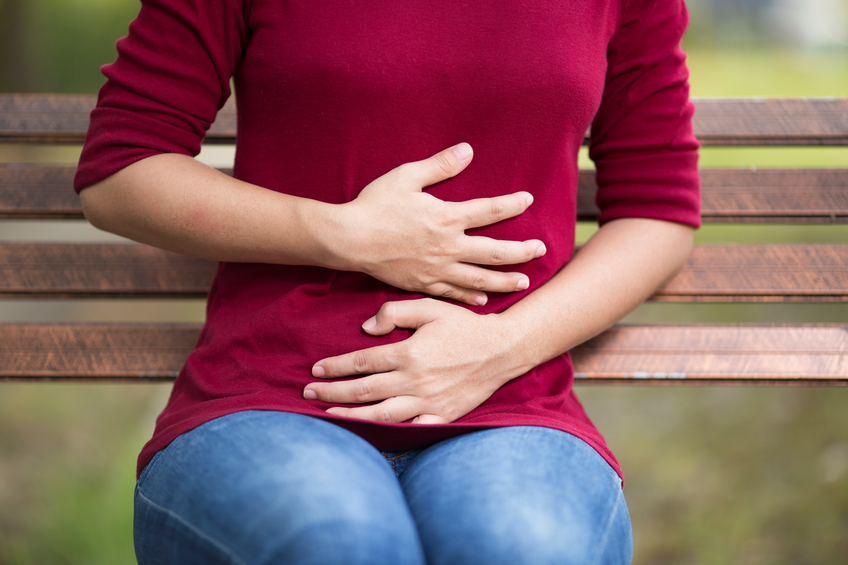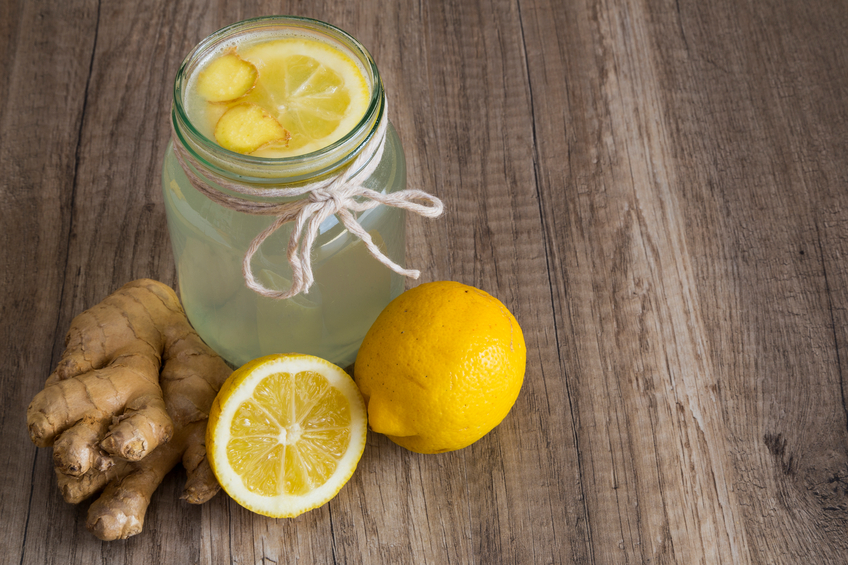Georgina Young invites us to give up those feelings of discomfort or embarrassment, and instead learn to nourish and improve your digestive system with all-natural remedies…

Digestive complaints such as acid reflux, bloating, constipation and diarrhoea are all too common within the UK. In fact, roughly 40% of people will suffer from at least one digestive symptom at any one time, with most digestive ailments stemming from poor lifestyle choices, foods that we’ve eaten, or stress. By making some simple changes to your lifestyle you can prevent many of these problems from happening in the first place. Thankfully there is a wide range of home remedies for symptoms such as heartburn, indigestion and other digestive ailments that can provide some short-term relief to sufferers.
Before I share with you some of my favourite home remedies, I’d like to discuss the effects that modern day life has on our digestive systems. The whole process of digestion starts within your brain, not your mouth. The physical and mental stresses of day-to-day life can put your body into a heightened state of stress that is commonly known as ‘fight-or-flight’. This is your body’s safety mechanism which enables you to fight or avert any impending danger.
In order to do so, however, your body must divert blood away from your digestive system and towards your vital organs such as your heart and lungs. As a result your digestion slows and your salivary response to food is hampered; decreasing your stomach acid, enzyme secretion and the release of important digestive hormones.
Although our daily stresses may be nominal, after all we aren’t evading deadly situations, but rather our screaming toddlers or ranting bosses, these low-level stresses are ongoing and so are highly likely to impair your digestion for the long-term.
How can you improve your digestion?
You can start by practicing some deep breathing or mindfulness techniques as you wake in order to create a sense of calm to your morning, giving your body time to prepare for digesting its food. Before you eat your breakfast, be sure to drink a glass of hot lemon water. The hot water helps to flush out your system, keeping your digestive tract moving along smoothly. But it is in fact the acidity of the lemon that steals the show; stimulating the production of hydrochloric acid within your stomach.
Hydrochloric acid is responsible for breaking down your food and killing off any nasty microbes that might hop along for the journey. The more hydrochloric acid you have, the more efficiently your food breaks down, meaning less bloating and gas, and less digestive issues all around. In fact, it is actually low levels of hydrochloric acid that cause these problems in the first place. Heartburn and acid reflux are caused by the loosening of the lower esophageal sphincter – it is the hydrochloric acid that keeps the lower esophageal sphincter tight and
closed off.
When you smell, think about, or chew your food, the salivary glands within your mouth release enzymes that start the process of digestion (this is also true within the stomach). For example, salivary amylase helps to break down starches contained within your food, while lingual lipase breaks down the fats. This is why chewing your food thoroughly is incredibly important – if you don’t, these enzymes cannot work effectively to break down your food, causing improper digestion and often or not unwanted gas and/or flatulence. You will also see a reduction in nutrient absorption. Chewing is vital for signalling the rest of your digestive system to prepare for incoming food and carry on the digestive process too.
Try to eat slowly at mealtimes, taking smaller bites, and chewing for longer. Chew soft foods 5-10 times, and more dense foods such as meats and vegetables up to 30 times before swallowing in order to prevent digestive issues. Be sure to make your mealtime a ritual – take a few minutes to unwind and relax, and avoid eating at your desk, in the car, or while walking. Sit down outside or at the dinner table. Also avoid drinking anything for 30 minutes after your meal as this can dilute digestive juices, making it harder to digest your food.

Exercise can heal your digestive system
Exercise can work wonders for your whole body – we all know that it’s great for our cardiovascular system and bones, but it’s also great for our digestive system too. In fact, riding a bike can help to prevent and reduce the symptoms of heartburn and light exercise can help to keep things moving altogether.
Yoga is my preferred exercise for relieving stress, toning muscles, and increasing flexibility. But it is also incredibly useful at flushing out toxins from your body and preparing your stomach for digestion. One of my favourite poses to practise first thing in the morning on an empty stomach (usually after my warm lemon water) is a simple yoga squat known as ‘Malasana’ or ‘garland pose’.
To practice, simply squat with your feet slightly wider than your shoulders, keeping them turned slightly out to the side. It is important to keep your heels on the floor. If you find that your heels rise up place a folded towel or blanket underneath them to provide support.
Keep your thighs slightly wider than your torso and exhaling, lean your torso forward, fitting it snugly between your thighs. Press your elbows against your inner knees, bringing your palms together. Inhale so that your stomach presses into your thighs, then exhale, letting your stomach move toward your spine. Repeat for 2-5 minutes (or as long as your body allows), using deep and controlled breaths. This breathing exercise will massage you internally, increasing blood flow to your digestive system.
Although certain kinds of exercises can be beneficial for your digestive system, some more extreme exercises can actually have a negative impact. Exercises such as intense or long-distance running can cause digestive disorders such as nausea, diarrhoea, acute gastritis and gastro-oesophageal reflux (GERD). In fact, it’s not uncommon for some endurance runners to find themselves running toward the toilet rather than the finish line. If you find that this is the case, be sure to avoid or limit high fat and fibre foods at least one day before running, and caffeine 3-6 hours before.

The best home remedies for digestive ailments
Apple Cider Vinegar
Much like lemon, apple cider vinegar can help to increase your stomach’s levels of hydrochloric acid, helping you to break down your food thoroughly. Apple cider vinegar can also help sufferers of heartburn and GERD by keeping the lower esophageal sphincter tight and closed off. To reap the benefits, simply enjoy 1 tablespoon of raw apple cider vinegar diluted in one cup of warm water. Sweeten with honey if you wish.
Bananas
Bananas are high in fibre which helps to keep you regular. But bananas also contain a type of soluble fibre known as pectin. Pectin soaks up the excess fluid within your intestines and slows down the passage of your stools making them a great remedy for diarrhoea. As bananas are also high in potassium, they help to restore electrolytes that have been lost from loose stools.
Blackstrap Molasses
Blackstrap molasses contains an abundance of vitamins and minerals, specifically magnesium, which is the fourth most abundant mineral in your body and essential to overall good health. Magnesium is also critical in relieving constipation – it helps by relaxing your muscles and increasing the water content in your intestines. This initiates the wavelike motion known as ‘peristalsis’ which moves your stools through
your intestines.
Simply dilute 1 teaspoon of blackstrap molasses in a cup of warm water and enjoy or add 1 tablespoon of tahini.
Chamomile
Chamomile is packed full of essential oils that have the ability to ease stress and tension in the body. It works by relaxing and toning the nervous system within the whole body, including the digestive system. A hot cup of chamomile tea, steeped for 10-15 minutes, can soothe the walls of your intestines, eliminating unwanted gas and any sharp pains that may be associated with it. It also helps to stimulate the secretion of bile, which eliminates toxins within the liver.
Fennel Seeds
If you’re a sufferer of gastritis or stomach aches caused by indigestion, then fennel seeds are for you. Fennel seeds contain the oil ‘anethole’ which stimulates the secretion of digestive juices, keeping things moving smoothly. They can also help to reduce inflammation of the stomach. For almost instant relief, either chew 1 teaspoon of fennel seeds thoroughly, or crush the seeds and steep in boiled water for 5-10 minutes before drinking.
Ginger
Chewing on root ginger, or drinking ginger tea, just 20 minutes before a meal can help to prevent acid reflux as it tightens the lower esophageal sphincter, preventing the back-flow of stomach acid. Ginger also helps to relax stomach muscles and push food through your bowels, thus preventing the formation of gas and is great for treating stomach aches, nausea and vomiting due to its anti-inflammatory properties.
 About the author: Georgie is a fresh faced, freelance writer and recipe developer who specialises in nutrition, fitness, and health and well-being. She enjoys sharing her passion for cooking, Paleofying food, and exploring Veganism within the Paleo diet on her blog, Greens of the Stone Age, and along the way has helped many friends to take a more holistic approach to their hectic lifestyles. She have further expanded upon her love of the Paleo way of living by setting up Primal Eye Magazine – the UK’s 1st online Paleo lifestyle magazine!
About the author: Georgie is a fresh faced, freelance writer and recipe developer who specialises in nutrition, fitness, and health and well-being. She enjoys sharing her passion for cooking, Paleofying food, and exploring Veganism within the Paleo diet on her blog, Greens of the Stone Age, and along the way has helped many friends to take a more holistic approach to their hectic lifestyles. She have further expanded upon her love of the Paleo way of living by setting up Primal Eye Magazine – the UK’s 1st online Paleo lifestyle magazine!
